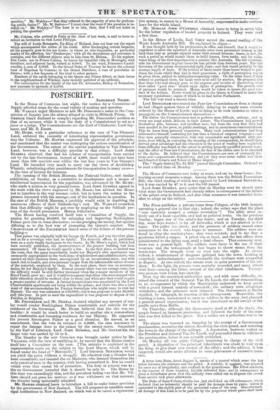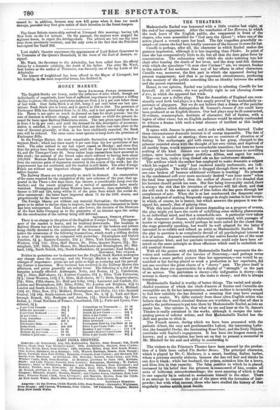The Times publishes a private letter from Cologne, of the
16th instant, narrating a general riot in that city; indeed, the writer says that the place The Times publishes a private letter from Cologne, of the 16th instant, narrating a general riot in that city; indeed, the writer says that the place "very narrowly escaped a serious revolution "! The affair arose en- tirely out of a local squabble, and had no political traits. On the previous Sunday, began one of the saint's-day feasts; and on Tuesday, the third day, some boys wanted to let off fireworks, which is not allowed in Co- logne. The police intecfered; and the presence of soldiery caused some annoyance to the crowd, who began to murmur. The soldiers were or- dered to clear the market-place; they were resisted; and in the fray a gendarme killed a cooper. A priest was at hand, and the last offices were administered to the dying man, amid a dead silence. That ceremony over, ' there was a general fight. The soldiers were fierce in the use of their weapons, and the townspeople at last began to throw stones from the house-tops. The struggle went on even into the night. At eleven o'clock, a reinforcement of dragoons galloped into the town, hacking at everybody indiscriminately; and eventually the civilians were compelled to disperse. At two o'clock the streets were in quiet possession of the sol- diery. In the fight, six persons were mortally wounded, and many others were hurt—among the latter, several of the chief inhabitants. Twenty- two persons were taken into custody.
Next day the municipal authorities met; and with some difficulty ob- tained the consent of the General Van De Luudt, the officer commanding, to an arrangement by which the Municipality undertook to keep peace with a guard formed. entirely of townsfolk; the military were altogether withdrawn, and the prisoners were released. The Government at Berlin signified, by telegraph, its sanction of this arrangement. Meanwhile, the working classes, accustomed to serve as soldiers in the array, had planned a general armed organization; but it was abandoned on the receipt of the pacific news from Berlin. On Thursday, although the thermometer stood at 96 in the shade, the people formed an immense procession, and followed the body of the man who was first killed to the grave. Not a soldier nor a policeman was to be seen.
The alarm was renewed on Saturday by the receipt of a Government proclamation, censuring the rioters, dissolving the civic guard, and. restoring , the town to the charge of the military. A deputation, however, waited on the President and General Van De Lundt, and persuaded them to withdraw, the proclamation, before it was actually published.
On Monday all was quiet; Cologne remaining in charge of the civil guard. A deputation of the principal inhabitants was about to wait upon - the King, to give their own version of the affair; and the address, it was supposed, would also make allusion to some grievances of excessive taxa- tion.
A letter from Bonn, dated August 5, speaks of a quarrel which arose the day before between the students and the police. A student, it appears, was arrested for some act of irregularity, and confined in the guardhouse. His fellow student*, to the number of three hundred, forcibly delivered him; and in consequence so great a disturbance arose that the military were called out to disperse the crowd. Some arrests took place afterwards.
The Duke of Saxe-Coburg-Gotha has just abolished an old ordonnance, which declared that no indemnity should be paid for damage done by game, unless it- amounted to the eighth part of the prestuned value ot the crop. Henceforward, all damage of this kind is to be paid for by the proprietor whose game shall have
caused it: in addition, farmers may now kill game when it does too much damage, provided they first give notice of their intention to the forest-keepers.



























 Previous page
Previous page